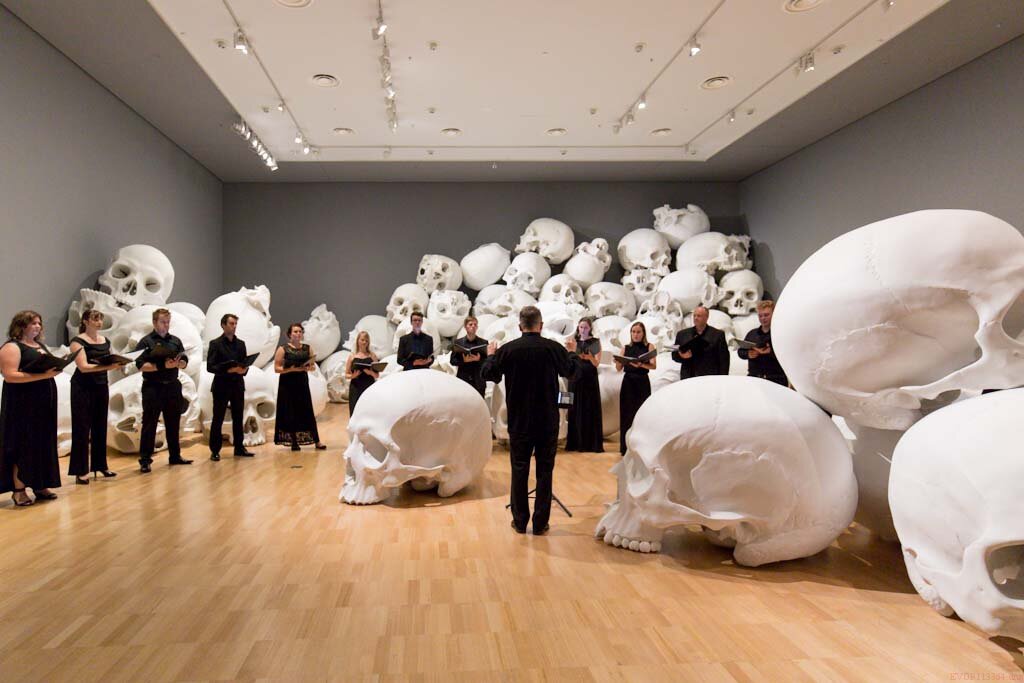
“Vivaldi’s Magnificat … is a tricky piece to achieve cohesion … but this was overall a successful collaboration. The choir achieved a full sound that was never forced and resonated with beautiful intonation.”
“let me take a moment to say the power and blend of the Polyphonic Voices ensemble is fantastic. These are clearly some seriously experienced singers, the kind who can instinctively communicate with one another with an almost terrifying exactness. I particularly enjoyed the mass of sound produced by the ensemble, one where the singers still embraced the individual colour of their voices…”
When I return to the room later that night, the Polyphonic Voices chamber choir are singing Amazing Grace in the corner. The crowd is silent, the sopranos soaring, the skulls watching over all. The work itself was astounding enough, but with voices like these it is breathtaking.
It takes a certain courage and boldness to pull it off, but two choirs can, on occasion, sound better than one... Much of the interest in this combined concert, however, lay in hearing and comparing the two choirs’ performance of their separate brackets of works first.
The Melba Spiegeltent surprises you from the moment you lay your eyes upon it. Set in the middle of Collingwood amidst average buildings, the colourful circus tent emerges out of the blue with wooden frames and stained glass that transport you back to the XIX Century. Furthermore, when Polyphonic Voices take the stage to perform the ensemble for Cabaret! – you know you’re in for a night of wonder.
Lying back on the plush reclining seats of the Melbourne Planetarium, watching projections of the Northern Lights dance gracefully above me accompanied by the ethereal music of Ēriks Ešenvalds, I couldn’t help but lose track of both myself and sense of place. At times I was so engrossed in the moment I felt that I too was exploring the northern reaches of the Arctic and not safely tucked inside the Planetarium Chamber. Such was the power and presence of ‘Beneath the Stars’, a special collaborative event held on 6 May by the Melbourne Planetarium and the Melbourne chamber choir, Polyphonic Voices. Attendees were treated to stunning visuals of the night sky and deep space projected onto the Planetarium’s overhead dome whilst listening to an incredible repertoire of classical music (and one highly significant pop song).
Allegri’s famously ethereal Miserere mei, Deus not only came to the audience from above but the soprano soloists were separately located above and behind the audience, giving their contributions an even more disembodied quality. It worked to brilliant effect and the soloists were impressive. In contrast, the choir descended to ground level for two motets by JS Bach, which, along with the choir’s hearty performance and a cheery little organ accompaniment, emphasised the more earthbound, localised nature of the Lutheran congregations he composed for.
The audience in St Paul’s Cathedral was treated to a wonderful night of choral music inspired by the idea of the Magnificat. Polyphonic Voices and visitors Voices New Zealand Chamber Choir. The choirs performed separately and together and, for the second half, were joined by the Australian Baroque Brass and the Polyphonic Players for a striking performance of Bach’sMagnificat. It was a night where the pieces chosen celebrated and honoured the Virgin Mary. Each choir exploited versatile groupings to good effect in the spacious volume that the Cathedral provides...
Grand goals for Melbourne’s newest chamber choir
Polyphonic Voices is set to close its inaugural year on the highest of notes with Magnificat!, a performance of J.S. Bach’s Magnificat (BWV 243a). But what makes this group stand out from the other choirs in and around Melbourne?
Drawing predominantly from the wealth of talent in the College and Church choirs of Melbourne, Polyphonic Voices aims to perform the finest choral music at the highest standard. It’s a professional-quality group, made up of 20 seasoned choristers who know all the ins and outs of the standard repertoire and are seeking to work at the next level.
The name Polyphonic Voices stems from the word ‘polyphony’, denoting the music of intricately interweaved melodies that one associates with the great composers of the Baroque period. Thomas Bland, president of the committee, notes that, “The name is a symbol for the talented individuals who have combined to make this exceptional choir.”
Under Artistic Director Mr Michael Fulcher, the group performed to packed houses at both its major concerts this year. Furthermore, with each set of new repertoire the committee of Polyphonic Voices seeks to create a real event – something more than your average concert. “We’ve finished our planning for 2015 and are really excited about what we’re putting on offer,” says Tom.
Melbourne will soon welcome the visiting King’s Singers again but our colleges too have their own rich source of choral talent, writes Tim Matthews Staindl. A new choir, Polyphonic Voices, has already had a successful debut and has plans for some enticing concerts in the future.
King’s Singers, Tallis Scholars, The Sixteen, the list goes on – groups that feed from the abundant pool of talent that is the collective college choirs of the UK. We marvel at these professional ensembles for their precision and consistency, but even more for the adoration of music they demonstrate in every performance. At the heart of this is a love of the choral sound and repertoire that their singers have nurtured for almost their whole lives.
The journey often starts at a children’s choir and there is no lack of these in Melbourne – think The Australian Boys/Girls/Childrens Choirs, Gondwana Voices, and so on. There are primary school choirs, high school choirs and finally, college choirs whose singers often have 15 or more years of choral singing under their belt. Many are established musicians with fine voices and a desire to further pursue their passion at the highest level.
It is at this point, however, that Australia’s choral landscape has been so lacking. Choirs outside of college have often felt like a step down for singers in terms of quality and commitment, despite the college choir’s overall function as a training regime for young adult singers...
Banner photo credit: Tobias Titz











